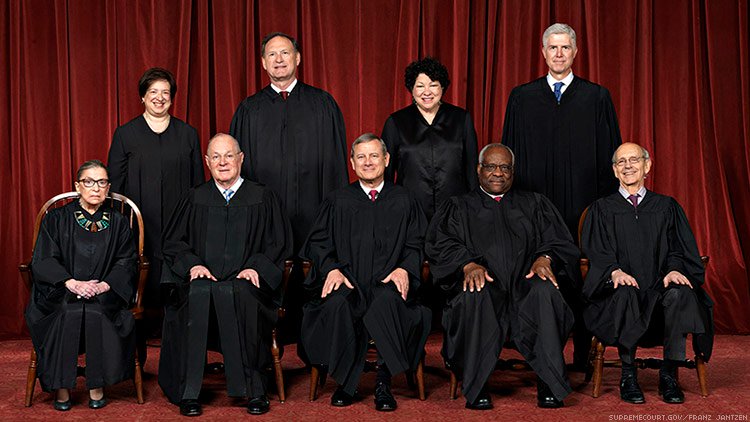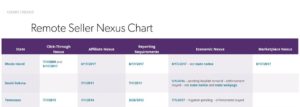South Dakota v. Wayfair is Decided: What Does It Mean for You?
On June 21, 2018, the U.S. Supreme Court (SCOTUS) issued its highly anticipated decision in the South Dakota v. Wayfair case. For those of us in the sales tax field, this decision is as big as it gets. We’ve been covering the case extensively here at the Sales Tax Institute, and now that the decision is here, we’ve had a chance to dig into it and get some ideas on how it could affect taxpayers across the nation.
About the Decision
In a 5-4 decision, the Court ruled in favor of South Dakota and overruled Quill Corp. v. North Dakota and National Bellas Hess, Inc. v. Department of Revenue of Ill. The Court concluded that “the physical presence rule of Quill is unsound and incorrect.” This is a big deal, since Quill had been the law of the land since 1992 regarding nexus for remote sellers and National Bellas Hess since 1967!
Writing for the majority, Justice Kennedy didn’t mince words as he delivered the opinion of the Court. In the opinion, Justice Kennedy broke down why “Quill is flawed on its own terms.” He wrote, “First, the physical presence rule is not a necessary interpretation of Complete Auto’s nexus requirement.” He continued, “Second, Quill creates rather than resolves market distortions” and “Third, Quill imposes the sort of arbitrary, formalistic distinction that the Court’s modern Commerce Clause precedents disavow in favor of ‘a sensitive, case-by-case analysis of purposes and effects.’”
The Court concluded that “…a business need not have a physical presence in a State to satisfy the demands of due process.”

Reactions
For some, the decision in South Dakota v. Wayfair was a long overdue reconsideration of the physical presence rule established by Quill. Justice Kennedy addressed this, writing in the opinion, “Modern e-commerce does not align analytically with a test that relies on the sort of physical presence defined in Quill. And the Court should not maintain a rule that ignores substantial virtual connections to the State.”
The Court remanded the case to the South Dakota Supreme Court to evaluate if the provision meets the other tests for constitutionality under Complete Auto Transit. The four prong test requires substantial nexus with the state, fair apportionment, non-discrimination against interstate commerce, and a fair relationship to the services provided by the state.
South Dakota v. Wayfair only addressed the substantial nexus test. Therefore the remand needs to address whether there are any other facts that would cause the South Dakota law to fail the test for constitutionality. So until the remand is addressed, South Dakota should not be able to enforce its provisions and the stay of enforcement remains in place.
The Impact on Taxpayers and Sellers
So where does this leave taxpayers and sellers, whom this decision could have a major impact on? Looking strictly at the South Dakota economic nexus legislation that was addressed in this case, South Dakota’s law minimizes the burden on out-of-state sellers. The legislation provides a safe harbor for small sellers: a remote seller must make in-state sales exceeding $100,000 or makes 200 or more separate sales transactions in the previous or current calendar year for the nexus provision to apply. The legislation also ensures that the nexus provision does not apply retroactively.
On top of that, South Dakota is a full member of the Streamlined Sales and Use Tax (SST) Agreement, which standardizes taxes to reduce administrative and compliance costs. And due to the tax structure in South Dakota, it is a fairly simple state – everything is taxable. This includes not just tangible personal property but also digital goods and virtually every service (including consulting, training, accounting, legal and other services). So, not much work to determine taxability.
The Impact on Other States
But here’s the big question: What does the decision mean for all of the other states? Take a look at our Remote Seller Nexus Chart and you’ll see that the states have been busy enacting legislation regarding remote sellers. Many states have enacted economic nexus legislation, some of it very similar to South Dakota’s legislation.
States Indicating They’ll Provide Updates and Guidance
In the wake of the decision, a few states were quick to issue announcements regarding the case. Several states (Louisiana, Minnesota, Mississippi, South Dakota, and Washington) indicated that they will provide updates and additional guidance regarding their legislation.
North Dakota
Most significantly so far, North Dakota announced that their economic nexus legislation is now effective. The effective date appears to be June 21, 2018, but the state has indicated that it will provide additional guidance.
Massachusetts
Massachusetts also announced that they believe their legislation which relies on a physical presence standard in the form of computer software or “cookies” in the state. Their statement reads: The Department of Revenue’s existing regulation 830 CMR 64H.1.7 (Vendors Making Internet Sales), which took effect in October 2017, continues to apply and is not impacted by the Supreme Court’s decision. This regulation, developed with the guidance of the Massachusetts Attorney General’s Office, explains how the general sales and use tax applies to vendors making Internet sales. There is litigation (Crutchfield Corp. v. Harding, Va. Cir. Ct., No. CL17001145-00, 10/24/17) pending on this issue but the law didn’t include a stay of enforcement so there is a risk for those that don’t comply.
Hawaii and Kentucky
A few states have effective dates of July 1, 2018 – Hawaii and Kentucky.
Kentucky has announced that they believe their statute meets the requirements under the decision and the legislation is not tied to a decision. Hawaii has not issued a notice on their position. However, their legislation also is not tied to the decision or any other conditions. Therefore, we believe these can take effect July 1.
It is important to note that Hawaii’s tax is a gross receipts tax and similar to South Dakota almost everything is tax – including sales at wholesale – although at a reduced rate of 0.5%.
States with Economic Nexus Provisions with Prior Effective Dates
What about other states with economic nexus provisions that had a prior effective date? What if they had litigation filed?
It is our opinion that any state that tied their effective date to a decision ruling that Quill is overturned does need to wait until South Dakota disposes of the remand on the case. We also believe that in any state that has its own litigation pending, they need to resolve their case through a summary judgement order. They may also need to allow an appeal process to conclude. So, based on this, it is our interpretation that those states can’t enforce anything quite yet.
And even once these things are addressed, then the question as to if their law can survive if it isn’t as simplified and direct as South Dakota’s? It remains to be seen, but we’ll continue to monitor all these states with economic nexus legislation and update our Remote Seller Nexus Chart regularly.

Unanswered Questions to Consider
The Court’s decision leaves a lot of questions unanswered. Is $100,000/200 transactions the minimum threshold? Does the decision require states to be a member of the SST Agreement? Does it require a simple rate structure or a simplified tax structure? And does the decision require prospective application only, or is retroactive application a possibility? After all, the Court did rule that Quill and National Bellas Hess are overturned. We don’t think states will be greedy and pursue a nexus claim prior to June 21, 2018 – but you never know!
And then of course, there are more than half of the states without a sales tax that haven’t passed a specific economic nexus provision. What about these states? Some of them have other remote seller legislation such as Click Through, Affiliate or Marketplace. Click Through and Affiliate have withstood challenges and we’ve supported that these should be complied with. Although Marketplace hasn’t been challenged yet, some of the largest marketplace facilitators have voluntarily complied in Pennsylvania and Washington. This has emboldened other states to mirror their legislation. Of course many people have argued that this is who should be collecting the tax when a facilitator is involved. But, it isn’t always clear that this is permissible under current state law everywhere.
Could a state take a position that they don’t need to pass any new legislation? Of course there is always a chance that could happen. Is it automatic? Not necessarily. We are working on a review of state laws as it relates to their definition of a “retailer doing business”. In states that include a list of physical presence type of activities and that is all, we believe they will require additional legislation. However, if a state has a catchall provision along the lines of, or any other activity permissible under the U.S. Constitution or Federal Law, then they may be ok to begin enforcement.
We’ve talked to a few states – Indiana and Missouri. Indiana believes they need to resolve their pending litigation. Missouri, which only has Click Through and Affiliate provisions, believes they would need specific legislation as well as simplification in their laws – potentially even adoption of provisions to become a Streamlined Sales Tax Project full member state.
What About Remote Sellers?
If you’re a remote seller making sales into states with economic nexus legislation, there are a number of factors you’ll need to take into consideration.
First, do you have any traditional physical presence? We do think this test and evaluation is still necessary as if you do, then the thresholds may not matter. As part of this evaluation, you’ll need to evaluate your sales volume by dollar and transaction (invoice) count by state. Remember this is TOTAL not just taxable!
The next step – which is the case in traditional physical presence nexus states is to determine if you have any liability. Taxability determination for the products and/or services you sell now becomes even more important. You can have a ton of nexus but if everything you sell is exempt, there may not be a need to register.
This is key if you sell for resale, sell services or digital goods or to industries that have broad exemptions like manufacturing. Registering to collect and remit sales tax in states is a major consideration. Once you determine you need to register, then you need to think about how you will do this. Depending on the complexity/volume of your sales, an automated tax solution may be critical to implement.
Staying Updated and Resources Available to You
Know that we’ll continue to monitor this situation closely across the states and will keep you updated. If you’d like to get more information on the Supreme Court’s decision, Diane Yetter, founder of The Sales Tax Institute and YETTER Tax, conducted a Facebook Live chat the day of the decision where she discussed it and answered questions that came up during the chat. If you’d like to see a recording, you can view it here. We’ll be updating the questions with answers within Facebook so you can look for those there.
We have compiled a list of resources to help you navigate making business decisions and evaluating obligations for you or your clients post-Wayfair. Visit our Remote Seller Resources page for state notices, helpful videos and articles, government resources, and more.
If you know you want some assistance in working through this for your company, we offer a Wayfair Risk Analysis that might be just right for you.


 About the Author:
About the Author: